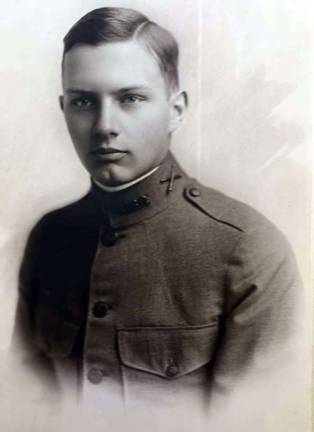Warwick's Citizens in the Great War: The writer Robert Putnum Benedict

By Aaron Lefkowitz
WARWICK — With the advent of compulsory education during the late 19th century, literacy rates in the modern world had grown to the highest point in human history up to that point.
Due to the outbreak of the Great War, millions of soldiers sent and received mail daily, thanks to great advances in transportation methods.
An estimated 12 million letters were sent weekly, with around two billion being sent through the entire war. Due to the demoralizing environment of the trenches as well as long periods of inaction for up to months in certain sectors of the vast fronts, soldiers took solace and joy in their only connection with the outside world.
One of these men, who was an especially proliferate writer was Robert Putnam Benedict, telling his loved ones about his experiences in battle.
Robert like so many others, was only 18, when he found himself in the ferocity of the war in France.
Robert had a tough beginning, his father passed when he was 2, and his mother, when he was 4, leaving him to be raised by an aunt, who affectionately referred to him as “Bobby.” He, in return, saw her as his closest family.
Before his enlistment, the then 17-year-old Benedict worked at the Warwick Valley Dispatch, where he was well-liked. In February 1917, two months before American entry into the war, Benedict signed up for the Army and handed in his letter of resignation.
Upon receiving his letter, Editor George F. Ketchum, responded with a message: “Go with your company, my boy; glad you have enlisted.”
Benedict was also promised that his job would be held for however long that he was in the service.
Ketchum knew Benedict’s service would entail incredible adventures that local people would love to read about.
So he told the young man: “Write your stories.”
The 107th Infantry DivisionLike many Orange County men, Benedict was in the 107th Infantry Division of the 27th Infantry Division, formed of New York National Guard troops, though men from other states served in it as well.
The division would see heavy combat during the latter half of 1918, fighting alongside the British and distinguishing themselves in the Battle of the Hindenburg Line.
The 107th is well-known in Orange County, as on the opening day of the battle, Sept. 29, 1918, 40 Orange County men would be killed, the highest one-day losses for an American Regiment in the entire war.
In recognition of this hallowed day, Orange County annually holds its own special Veterans Day. Due to its impact, the Orange County Historian Johanna Yaun had led a group there for the centennial of the battle.
But Benedict was not among those 40 killed that day.
He would survive through the chaos and carnage of the battle, gaining a citation for evacuating wounded men under heavy fire. As the opening day was especially known for the ferocity, Benedict exemplified bravery by rescuing his brothers in arms, indifferent to his own wellbeing. He would celebrate his 19th birthday on Oct. 6 just as the battle was wrapping up.
As often as he could, he would write letters to his aunt, telling her of his experiences, the challenges faced against a hardened enemy and the hope of a close end.
For a such a young man, what he witnessed was unimaginable, but by having someone to write to, he could keep himself sane. His aunt would keep all of his letters and donate them to the Warwick Historical Society. The battle would play a pivotal role in winning the war, as it was a strong point of the Germans’ defenses, believed by many experts to impenetrable. With its capture, German forces would be forced out of the area.
‘His life for the cause of his country’While the Hindenburg Line had been broken, German resistance to hold its ground till the last man. During one of these engagements, Benedict would fall in the line of duty, on Oct. 19, 1918, less than two weeks after his birthday.
The telegram informing his aunt of his death came only a few days before his last letter would arrive home.
The memorial document, given to his aunt by the United State Army, stated that “he bravely laid down his life for the cause of his country.” It was signed by American Expeditionary Force Commander, John J. Pershing.
Feeling a great responsibility for his men, Pershing would spend the rest of his life committed to the memorials and cemeteries, built in France for all those who fought and died in service.
However, Benedict would be returned to his hometown and lies in the Warwick Cemetery. He rests in the shade, watching quietly as life in Warwick goes on peacefully. As well, a monument was erected in the cemetery in honor of his sacrifice.
The Benedict family still resides in this area, and so Bobby’s memory is not lost. He is celebrated as a family member who answered his nation’s call and gave everything for his homeland.
And because of his aunt’s donation of his letters, certificates and photographs to the Warwick Historical Society, he lives on to his hometown as well.
A special thank you to Mary Ann Knight, for her help with information and the photograph of Benedict, without her, this article would not have been possible.